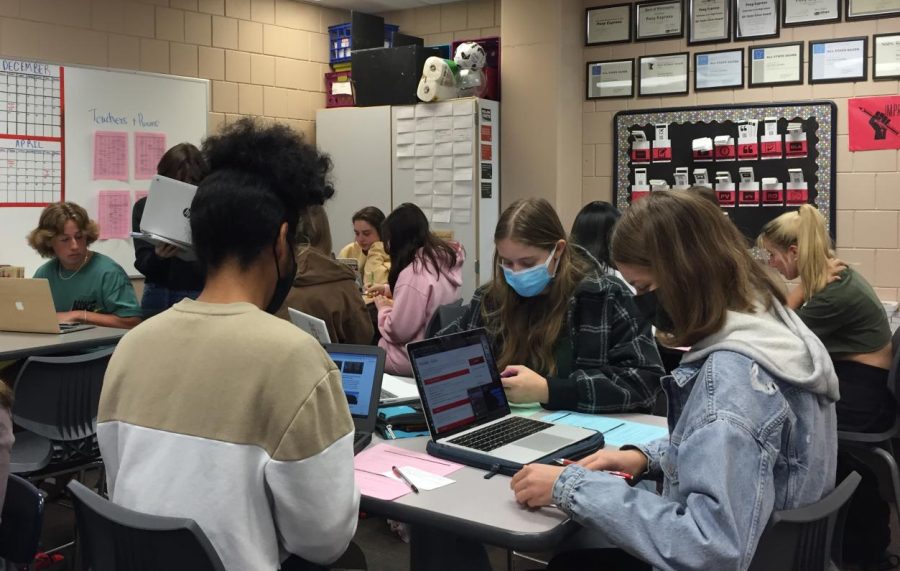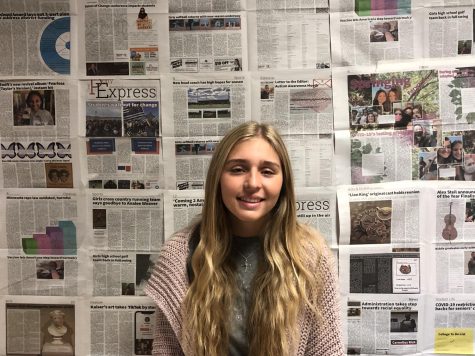School Board poses two levy questions Nov. 2
Class sizes average 30 to 40 students. If the first levy question on Nov. 2 fails to pass, class sizes are expected to grow by ten to twelve kids.
October 20, 2021
The current operating levy expires this fall and the School Board is asking the community to renew it. Polling stations are welcoming citizens to vote on this referendum and other local elections on Nov. 2.
The first question posed by the School Board involves the operating costs of the district. The current operating levy has been in place since 2013. Therefore, the administration suggests the replacement, rather than the renewal of this levy due to inflation.
Katie Hockert, School Board member, explained she has worked to support the Vote Yes for 834 campaign through conversations with her neighbors and by volunteering at a phone bank.
While state funding is provided, the gap between the needs of the district and how much money is supplied is growing. The expiring levy accounts for 10% of operating costs, which is roughly $12 million each year. If the new levy fails to pass, students will face increased class sizes and the reduction of activities and programs.
“My number one role is as a father. That makes me very nervous for what my daughters would experience, in their classroom setting, and what could be provided to them,” Josiah Hill, English teacher and local St. Croix Education Association President, added
In addition to voting on the operating levy, a question concerning a technology levy will also be included on the ballot. Officially, this question is referred to as the Capital Projects Levy. This would fund the replacement of outdated devices in school, the ability for students to borrow a computer, and to increase cyber security efforts.
Hockert hears remarks from parents about cyber security. “That is definitely on our radar and would be helped immensely with having that tech levy passed,” she explained.
The main goal of the Capital Projects Levy is in response to last year’s distance learning challenges. The district had to purchase discarded computers from another school to allow adequate access to technology for students learning at home. With the funding from this levy, the district would purchase more devices for at home use.
“If you think about the fact that devices help open up learning so that it doesn’t just have to happen during the six hours that you’re at school during the day. It can happen at any time, you can access materials, and learn from wherever you are. That really is the vision of the future in terms of education, and it’s something that we really need to provide for our students,” Bev Petrie, School Board Chair, said.
Due to inflation, the first levy will increase taxes by 17 cents per month for the average household in the district. Meanwhile, the technology levy will create an additional $11.50 per month.
“We are not promising any extra new programming, or new initiatives at this time…the feedback we got from the community, they said shore up our academics and kind of keep things going as is that people were not really interested in new programs. So we were trying to be respectful of that feedback,” Hockert added.
Hill encourages his fellow voters to look for information on the district’s website, “As we look forward, we hope that our friends and neighbors would educate themselves on what this is.”









Olivia Kuslich • Dec 20, 2021 at 6:09 pm
This story helps clear so much confusion around how the levy works and it also helps spread awareness to the importance of renewing a levy with cause and effect .I like how statistics are included as it helps paint a picture of how the renewal and inflation are connected.
Tyler Quade • Nov 8, 2021 at 8:20 pm
Thank you so much for this article! It made the levy very accessible to students, who may not be as involved in local politics. Very professional language, while still being clear to your audience. I think you could have expanded on the topic a little further, but looks good otherwise!